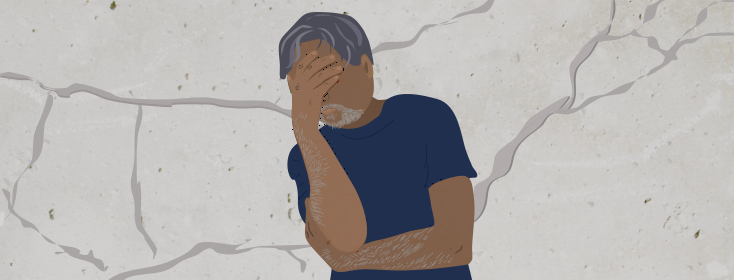Taking Time to Cry
It isn't always easy to find the time to cry, to vent emotions, to feel the sadness, and Let It Go. Not everyone is hardwired to release their feelings easily and some are afraid to face them at all. But being sad is not a sign of weakness. Crying does not equate to defeat. In fact, being able to embrace the grief inherent in living with a cancer diagnosis can help to prevent depression and make coping easier in the long run. But there must be emotional space available to experience this grief, and that can be difficult to set aside when patients are overwhelmed by their basic physical needs and the requirements of continuing to live their lives.
Navigating a new emotional terrain
Understanding that all patients must navigate through new emotional terrain is important. We will feel the rawness of desperation, panic, and even shame -- for many reasons, we may also try to tuck these emotions away and not display them to others, even trying to hide them from ourselves. Well-meaning friends or associates may say things like "be strong, you've got this" or "everything happens for a reason," but these platitudes meant to be uplifting and positive are actually very hurtful to some patients.
We cannot be strong without first acknowledging our weakness. And, frankly, that veneer of trucking along on our own come what may, being fiercely independent and oh, so strong, is simply more convenient for everyone else who would otherwise have to deal with whatever a patient is really going through. Eventually, under stress, all veneers crack to reveal their crumbling foundations.
No one deserves cancer
And the idea that everything happens for a reason is insidious. While we may learn from our mistakes and we may even find new meaning in our lives through adversity, the notion that everything happens for a reason bears with it the underlying core that we deserve what happened to us. That is simply untrue. Nobody deserves to get cancer. Yet we are shamed into feeling this is somehow our fault or our destiny because of who we are. Being able to find new purpose in light of a diagnosis might be a wonderfully uplifting thing for some patients, but it is a far cry from the cancer being gifted to the patient for a reason.
Then we are left with a stack of responsibilities and the associated guilt that drives their completion or is derived from the inability to live up to expectations (of others or ourselves). And let's not forget "survivor's guilt," that feeling of not being worthy to still be here when so many with the same diagnosis are gone. Guilt drives out happiness and creates unease. It leads to resentment, even anger. But what many people refuse to accept is that anger and resentment are natural reactions to this kind of major, forced life change.
Taking time to acnowledge our emotions
For most of us, if we are going to find the strength or some new purpose to keep us motivated and going forward, staying strong, then we are going to need to be able to look deeper within ourselves. And to do that, we need to release that obfuscating layer of sadness that people around us might be afraid to see or that we might be afraid to reveal. But we must also accept that sometimes grief lingers: some things are not "fixable," we must simply live with them as intrinsic parts of our lives. But to do that, we must be able to grieve. We must take the time to cry. And those who truly support us will be there to share our sadness.1
Do you find it important to take time for your emotions? Share your experience with the community here.
Editor’s Note: We are extremely saddened to say that on October 21, 2018, Jeffrey Poehlmann passed away. Jeffrey’s advocacy efforts and writing continue to reach many. He will be deeply missed.

Join the conversation